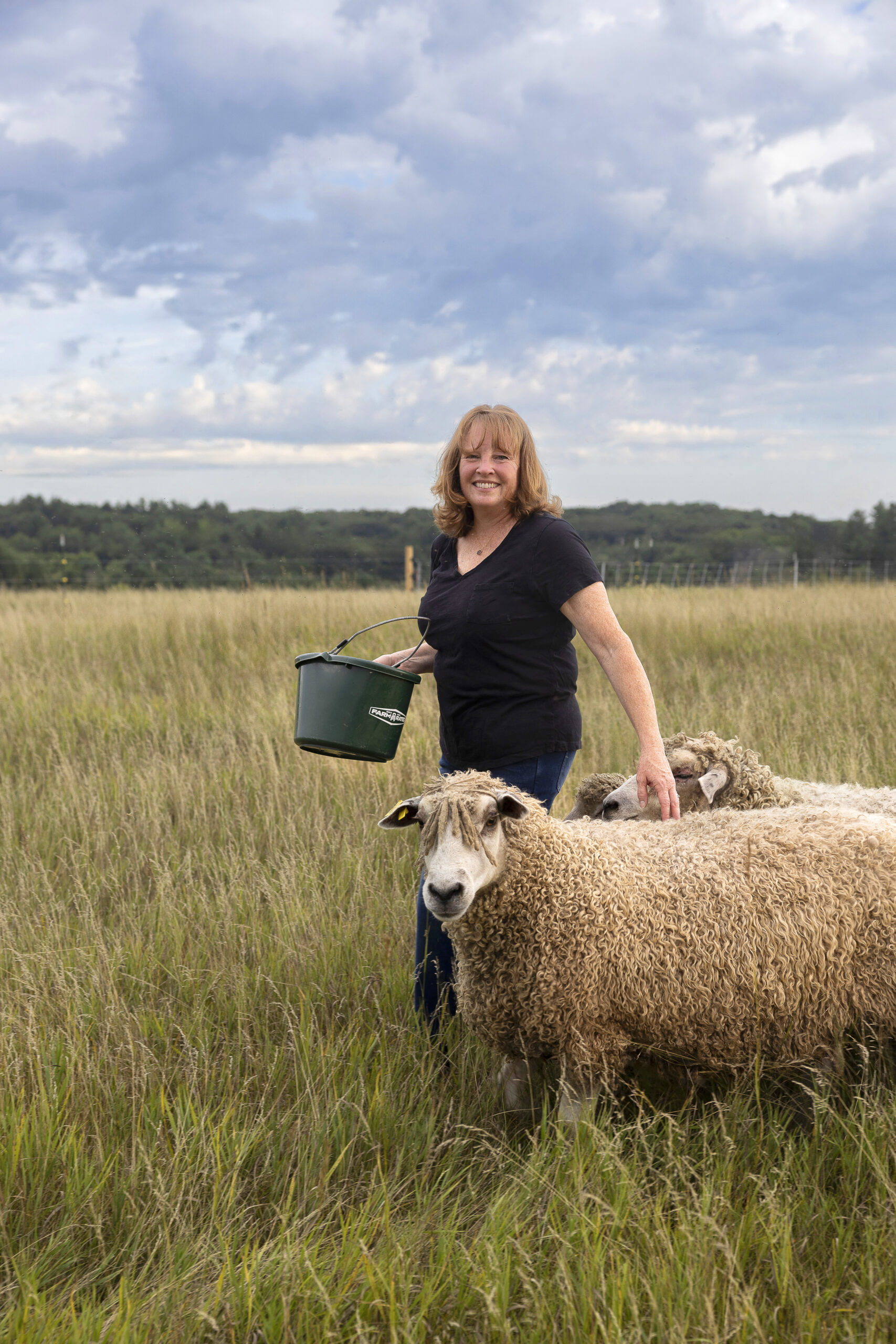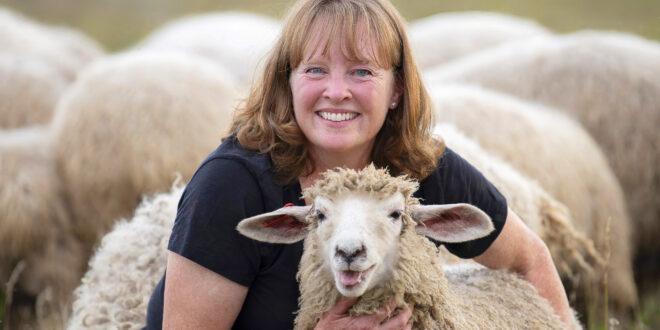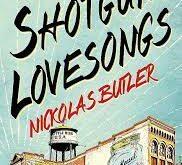By Katie McKy
Photo Credits: Leslie Duffy Photography
Beth Ivankovic, a Cotswold Sheep shepherd and co-owner of Eau Claire-area Priory Farms, was a pharmacist in her earlier career. A second career isn’t uncommon, but it usually means switching to a parallel track, like an actor becoming a musician or an English teacher becoming a writer.
Ivankovic did carry some of her science-based analytical background into raising sheep. For example, a pharmacist is acutely aware of the declining effectiveness of antibiotics due to their overuse, which gives bacteria more and more chances to develop immunity to them. Likewise, medications long used to kill parasites in sheep are becoming less effective. So, Ivankovic looks away from factory-made medication to natural, proactive ways to reduce parasites.
“All rudiment animals have parasites, but I minimize their dependence on anti-parasitic medication by rotationally grazing,” Ivankovic said.
Moving the sheep from one part of a pasture to another breaks up the parasite life cycle.
“This way, I can manage the parasite issues with the least amount of anti-parasitic medication,” she said. “This approach hits a bunch of my passions: medication resistance, improving the world, foresight in land use, and farming soil.”

To Ivankovic, “farming soil” means steadily improving the soil. It’s more work to move the sheep from pasture to pasture, but doing so spreads their soil-enriching manure over Priory Farm’s 40 acres. Ivankovic even places their winter hay bales in different spots for the same reason. It’s more work, but moving the hay moves the sheep, which keeps enriching the soil and even improving water quality.
“I make the sheep walk out to the bales of hay and along the way and back, they spread their nutrients,” Ivankovic said. “Better soil absorbs more moisture, which filters rain better, and purifies the water that ends up in our aquifer.”
Moving sheep helps the earth in another way.
“Sheep help the land by growing a stronger pasture,” Ivankovic explained. “Their grazing stimulates growth, which makes a stronger root base. However, if you let an animal keep eating grass and they go too far down, it tells the plant to stop growing because something is wrong. Moving sheep means more species of grasses, which make a more diverse, more resilient, and healthier pasture.”
You might wonder why Ivankovic shucked her white lab coat to move into shearing the white coats of Cotswold sheep, which produce the world’s whitest wool.
“I always, always wanted to live on a farm,” she said. “I grew up in southeastern Wisconsin, and my dad owned an aluminum smelter foundry, which is as far from farming as one can get. He was an aluminum recycler — one of the first. He’d melt it into ingots so that it would be reused, but I always wanted animals, and we just had dogs and gerbils.”
When 40 acres abutting their farmhouse went on the market, the Ivankovics bought it, but not with any specific intent. Then her husband Slavko suggested that they do something with it.
“Local farmers said it was great pastureland and suggested cows,” Ivankovic said. “Growing up in the city, cows seemed really big.”
So, Ivankovic took a shepherding course.
“I knew some friends who were raising sheep, and I thought if they could do it, we could too,” she said.
They started with just four, and they had to be hardy enough to be outside in Wisconsin winters, as they didn’t have a barn.
The Cotswold sheep were perfect. They’d been introduced to Great Britain by occupying Roman soldiers who needed a way to stay warm in those northern winters. However, they do more than keep one warm.
“They’re easy keepers and good moms with great wool,” Ivankovic said. “They’re a lovely first-time sheep for people who didn’t know what we were doing.”
Beth and Slavko got up to speed by tapping the generous wisdom of other shepherds from coast to coast.
“The mentors I’ve met through this are one of the best things about shepherding,” she said. “Sheep people are wonderful and always willing to help. I have some shepherd friends on speed dial. They’re across the United States and some are local. One turned 93 last summer. He had run a 1,000-sheep ranch in Wyoming. He would walk me through all problems. He was so calming, so knowledgeable. All my mentors are fantastic shepherds and so willing to help.”
Today, Ivankovic pays it forward by serving as the Vice President and interim Secretary for the American Cotswold Record Association.
The Ivankovics also have two livestock guardian dogs to help.
“They’re Great Pyrenees/Akbash mix, weighing between 100 and 110 pounds,” Ivankovic said. “They protect our sheep from coyotes mostly, but also the occasional bobcat or fisher. Just their barking and running along the fence keeps predators out.”
Even with multiple hands and paws pitching in to keep the sheep healthy, happy, and safe, some days are long.
“At lambing time, it’s 24/7 of us checking at least every two hours to make sure they have food, water, and hay,” Ivankovic said. “Otherwise, we have to move them every three days to a new section of grass in the summer. There are also sheep shows, spinning wool, and daily chores. In a pinch, we can do the chores in an hour, but some days, it’s ten hours of fixing fences and working with the wool.”
Ivankovic loves all the work.
“Cotswold wool is fantastic to spin and great in weaving, knitting, and crocheting,” she said. “It’s also great for natural dying. I hope to have classes on all this one day.”
She also loves the history of Cotswold sheep. When the Romans left Great Britain, they left their Cotswold sheep behind. Those sheep multiplied and multiplied and forever changed England’s comely Cotswold region and Great Britain, too. It was said that by the early medieval times, “half the wealth of England rides on the back of a sheep.” That wealth built Cotswold’s world-famous churches, financed by wool merchants and called “wool churches.” Travel across the Cotswold region, and you’ll drive on many Sheep Streets, Shepherd’s Lanes, and Wooly Roads.
Cotswold wool is rumored to have been the wool of the Golden Fleece, but it’s no rumor that it’s the wool that made the coats of Great Britain’s world-conquering, world-famous red coats. Ivankovic loves them for all these reasons and more.
“I love the animals. It’s such a joy to be with them,” she said. “Their nickname is the gentle giants. They’re super sweet. You watch them deliver a lamb and you think, ‘This is a miracle.’ They’ll be cleaning one lamb and pushing another to nurse. They’re always on your mind.”
And the sheep make for sublime moments.
“What surprised me is how much we love it,” Ivankovic said. “We’ve become homebodies because we love it, walking out after dinner and checking on everybody. It’s so much fun to see animals grow and thrive. And we’ve met so many fantastic people doing fiber arts. I’ve always been crafty, but now I get to play with their wool, too. I love to spin and weave, too.”
Lastly, Ivankovic loves playing a part in keeping a breed that once dotted hillsides by the millions, but is now increasingly rare.
“We need to save these heritage breeds,” she said. “Genetic diversity makes for a healthier world. All these different breeds and wools all have great uses. Even the meat end of things is important, as Cotswold are supposed to have a really wonderful, mild meat. More people need to raise sheep.”
Sidebar: Want to see the gentle giants of Priory Farms with their lustrous, silky fleece for yourselves? Ivankovic explains, “We had an open house last fall. We do an open house at least once a year, with the Wisconsin Farmers Union and the Three Rivers Fibershed. And I’m working on a potential spinning class for this fall!”
 Chippewa Valley 5ive for Women The Chippewa Valley’s Premier Magazine for Women!
Chippewa Valley 5ive for Women The Chippewa Valley’s Premier Magazine for Women!








